During Women’s History Month, NSRWA is excited to recognize several women whose sustained contributions to the Association have made a significant difference to the health of our watershed.
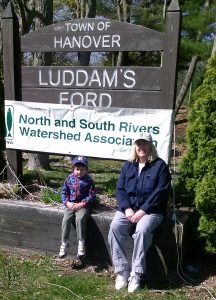 A life-long resident of Hanover, Judy Grecco lives in the house once owned by her grandfather, “an old-fashioned pig farmer” who taught her to appreciate the natural world at an early age. Throughout her long service to the town and region, she has drawn on her family’s connection to the earth in order to mentor and inspire others. As a member of the Hanover Open Space Committee, she has championed the development of walking trails and educational programs. As the long-time Administrator of the North River Commission, she oversees the permitting process for the first – and only – Scenic Protected River in Massachusetts.
A life-long resident of Hanover, Judy Grecco lives in the house once owned by her grandfather, “an old-fashioned pig farmer” who taught her to appreciate the natural world at an early age. Throughout her long service to the town and region, she has drawn on her family’s connection to the earth in order to mentor and inspire others. As a member of the Hanover Open Space Committee, she has championed the development of walking trails and educational programs. As the long-time Administrator of the North River Commission, she oversees the permitting process for the first – and only – Scenic Protected River in Massachusetts.
For NSRWA, at one time or another Judy has volunteered for virtually every program sponsored by the Association. In the words of Executive Director Samantha Woods, “You name it, she does it!” Her favorite activities? Almost 20 years ago, she remembers taking her then 8-year-old grandson on her weekly water-testing trips. And to this day, she leads scenic walks for the Association, including the annual New Year’s Day Walk, and guides the popular pontoon boat tours past the former sites of the North River shipyards. Her advice to anyone interested in protecting our natural resources? “Just volunteer. Don’t feel you have to know anything – there are many people who would love to teach you!”
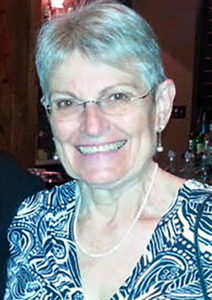 Barbara Carney’s journey from her childhood home in land-locked Melrose to her current house on the banks of Marshfield’s South River goes through Lake Fairlee, Vermont, where she spent many happy summers at Girl Scout Camp back in the day. Her parents covered the cost of the first week, but she had to earn the second-week’s fee by selling Christmas cards to her always-obliging neighbors. “Perhaps they just wanted an extra week of peace in the summer,” she says in retrospect. She learned to canoe on Lake Fairlee and during her camp’s annual paddle on the Connecticut River – “in an old wooden canoe,” she reminds us, not the lightweight models in use today.
Barbara Carney’s journey from her childhood home in land-locked Melrose to her current house on the banks of Marshfield’s South River goes through Lake Fairlee, Vermont, where she spent many happy summers at Girl Scout Camp back in the day. Her parents covered the cost of the first week, but she had to earn the second-week’s fee by selling Christmas cards to her always-obliging neighbors. “Perhaps they just wanted an extra week of peace in the summer,” she says in retrospect. She learned to canoe on Lake Fairlee and during her camp’s annual paddle on the Connecticut River – “in an old wooden canoe,” she reminds us, not the lightweight models in use today.
In 1969, those childhood experiences helped guide Barbara and her family to Marshfield, where she soon became involved in a variety of civic organizations, including the Evening Women’s Club, town Beautification Committee, and North River Art Association. She is also active in the Back Roads of the South Shore, which helps communities along Route 3A maintain and promote historical sites located on or near the ancient “Mattachusetts Payth” from Plymouth to Boston.
Barbara’s involvement with NSRWA began in a 1976 tennis lesson with the legendary Jean Foley, who had been instrumental in founding the Association in 1970. In 1977, Barbara joined the Board of Directors and soon became the Association’s Secretary. “I’m an inveterate note taker,” she admits. “Mostly to augment a faulty memory!” Her views on the future of NSRWA? After almost 50 years, “we’ve become the go-to organization for water issues” in the region, she states proudly. From here, “the sky’s the limit!”
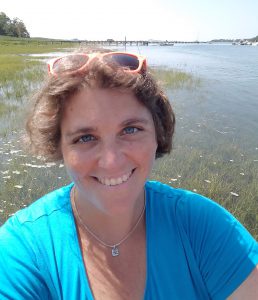 Sara Grady, NSRWA’s Watershed Ecologist and MassBays Regional Coordinator, grew up in Harvard, Massachusetts, but spent her summers in Marshfield. Throughout her childhood, she says, she rarely passed an opportunity “to get in the water and mud” while wandering in the Harvard woods or exploring the Marshfield rivers. By the age of 7 she knew she would dedicate her life to the study of water – a dream she made real through an undergraduate degree in aquatic biology from Brown (where her senior thesis focused on the North and South River salt marshes) and a PhD from BU’s marine biology program at Woods Hole.
Sara Grady, NSRWA’s Watershed Ecologist and MassBays Regional Coordinator, grew up in Harvard, Massachusetts, but spent her summers in Marshfield. Throughout her childhood, she says, she rarely passed an opportunity “to get in the water and mud” while wandering in the Harvard woods or exploring the Marshfield rivers. By the age of 7 she knew she would dedicate her life to the study of water – a dream she made real through an undergraduate degree in aquatic biology from Brown (where her senior thesis focused on the North and South River salt marshes) and a PhD from BU’s marine biology program at Woods Hole.
Like many current and former NSRWA staffers, Sara began as a volunteer, winning the 1998 Volunteer of the Year Award for her leadership of the South River Initiative. Happily for all, the MassBays Coordinator position became available just as she was finishing her doctoral studies in 2005, and she has spent the last 14 years building partnerships within the 9 coastal communities from Cohasset to Plymouth. One of her first accomplishments was to secure grant funding for removal of the Tack Factory Dam. Since then, she has brought her enthusiasm and intellect to develop Citizen Scientist engagement programs, study the loss of eelgrass in Plymouth Bay, and restore stream flow to First Herring Brook. She and her husband are also nurturing the next generation of environmentalists – their daughter is an avid swimmer and their son is already a bird enthusiast at age 3. His favorite? The Goldfinch!
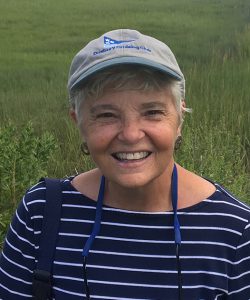 After moving to Marshfield in 1976, Jeanne Ryer fell in love with the North River during her commute to the Norwell Public Library, where she was Head of Adult Services. Her very personal relationship with the river deepened when she began kayaking on the river and walking to her favorite spot on Damon’s Point to “feed my soul,” she says. She soon began volunteering at NSWRA – helping to count the herring and horseshoe crabs – and served on the Board of Directors for 2 years. As a librarian, she also helped organize exhibits relating to the watershed and the Association’s stewardship programs.
After moving to Marshfield in 1976, Jeanne Ryer fell in love with the North River during her commute to the Norwell Public Library, where she was Head of Adult Services. Her very personal relationship with the river deepened when she began kayaking on the river and walking to her favorite spot on Damon’s Point to “feed my soul,” she says. She soon began volunteering at NSWRA – helping to count the herring and horseshoe crabs – and served on the Board of Directors for 2 years. As a librarian, she also helped organize exhibits relating to the watershed and the Association’s stewardship programs.
In 2018, Jeanne received the Barbara Pearson Memorial Award for leading the successful effort to ban plastic bags in Marshfield. She credits NSRWA Executive Director Samantha Woods for inspiring her to “think globally, but act locally,” and she continues to assist community groups in Scituate, Pembroke, Hull, Hingham, and Norwell to reduce our use of plastic. The key is to get “people to think about their personal behavior and patterns,” she says. Her newest project? She is working on a community choice aggregation program that will provide Marshfield residents access to alternative energy suppliers. Her motto? “Progress happens from the bottom up.”
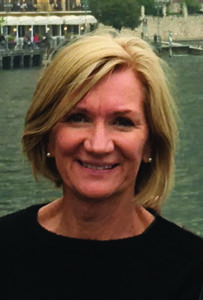 Fellow Marshfield resident Susan Caron couldn’t agree more. Her advice is to “jump in wherever you can… small actions can have big effects.” Her own jumping off point came in 2002, when she was invited to serve on the town’s Open Space Committee, an experience that fundamentally changed the way she connected with the town and taught her to appreciate the challenges of the watershed. For me, “it was life-changing,” she says. She went on to chair the committee, join the NSRWA Board, and serve on the Association’s Advisory Council.
Fellow Marshfield resident Susan Caron couldn’t agree more. Her advice is to “jump in wherever you can… small actions can have big effects.” Her own jumping off point came in 2002, when she was invited to serve on the town’s Open Space Committee, an experience that fundamentally changed the way she connected with the town and taught her to appreciate the challenges of the watershed. For me, “it was life-changing,” she says. She went on to chair the committee, join the NSRWA Board, and serve on the Association’s Advisory Council.
Susan’s proudest accomplishment is the South River Park and Greenway project, which has transformed a deteriorating commercial/industrial site into one of the few ADA-compliant sites within the North and South River watershed. In 2009, she received the Barbara Pearson Memorial Award for her leadership in establishing the Friends of the South River Park and Greenway (www.friendsofsrpg.org), which sponsors concerts and other events to raise funds for the preservation and expansion of accessible open space. A registered nurse who has always been interested in the environmental influences on public health, she is, in the words of NSRWA Executive Director Samantha Woods, a “visionary woman who has worked tirelessly to save lands that protect our waters.”
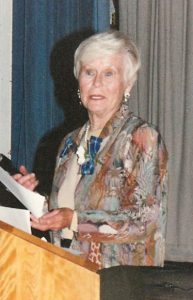 Jean Foley, foundress of the NSRWA, is one of the original Women of the Watershed! A Scituate resident and avid birder, in 1969 Jean became aware of the disappearance of two types of sparrows typically seen near the town’s salt marshes. Taking matters into her own hands when the town failed to investigate the matter, Jean sounded the alarm and sought help from other like-minded citizens, including water resource specialists, employees of state environmental agencies, a wildlife biologist, members of local conservation commissions, and an attorney – all residents of watershed towns. In 1970, Jean and her husband, Jack, hosted the first organized meeting of the group that would become the NSRWA. Jean has passed, however, nearly 50 years later, her legacy can be found in our ongoing commitment to protect our incredible watershed.
Jean Foley, foundress of the NSRWA, is one of the original Women of the Watershed! A Scituate resident and avid birder, in 1969 Jean became aware of the disappearance of two types of sparrows typically seen near the town’s salt marshes. Taking matters into her own hands when the town failed to investigate the matter, Jean sounded the alarm and sought help from other like-minded citizens, including water resource specialists, employees of state environmental agencies, a wildlife biologist, members of local conservation commissions, and an attorney – all residents of watershed towns. In 1970, Jean and her husband, Jack, hosted the first organized meeting of the group that would become the NSRWA. Jean has passed, however, nearly 50 years later, her legacy can be found in our ongoing commitment to protect our incredible watershed.
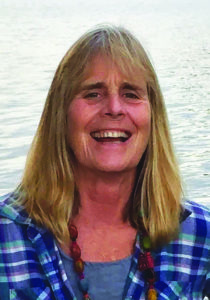
When she was 5 years old, Deb Lenahan planted her first carrot in the backyard of her family home overlooking Lake Michigan. Less than 10 years later, she watched in horror as thousands of dead alewives washed up on the shores of a now polluted lake. “My backyard was dead,” she recalls. Thanks to the Clean Water Act and other measures, Lake Michigan is now much healthier, but the memory of those fish has kept her focused on environmental issues ever since.
When she moved to Hanover in 1985, Deb quickly discovered the beauty of the Indian Head River, which still contained salmon thanks to a long-ago state stocking project. But the number of fish was rapidly declining, and when she read about NSRWA’s conservation programs in the local paper, she signed up to do water testing. Within a short time, she became Assistant Director and eventually Executive Director of the Association. Among the many projects she worked on during those years were the successful efforts to clean up the illegal discharge into the Herring River from the Scituate Wastewater Treatment Plant, and the restoration of the clam beds off Damon’s Point in the North River. “Frankly,” she says, “I never thought shellfish beds would re-open on the South Shore.” But she was happy to prove herself wrong.
And what about the future? Deb thinks the millennial generation has revived the environmental movement, while educational initiatives such as those offered by NSRWA are attracting children and teenagers in increasing numbers. She gets excited when she talks about 5th graders learning about water cycles in the “Water All Around Us” program. “I have high hopes!”
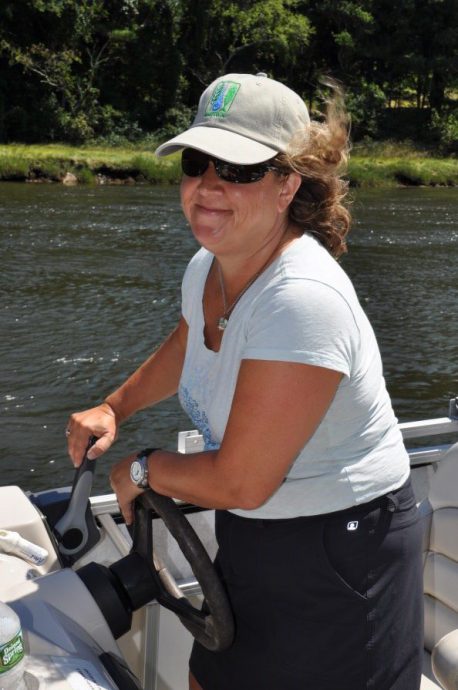
Samantha Woods, who became NSRWA Executive Director in 2002, was drawn to the environment at an early age, growing up near the Westfield River in western Massachusetts. At first, she thought her contribution to a healthier environment would be as a designer of green structures, and she enrolled in the architecture program at Wentworth Institute of Technology, where she worked as an intern for a civil engineering company doing early site work for Boston’s “Big Dig.” Then two things happened: she experienced first hand how the city’s infrastructure can negatively impact the harbor and nearby river watersheds, but also how successful interventions – such as the Boston Harbor cleanup and the Charles River restoration projects – can literally turn the tide. So after graduation, she entered the marine ecology master’s program at UMass/Boston, where another internship brought her to the North and South Rivers Watershed Association.
Samantha’s first assignment at NSRWA was to help monitor herring in the First Herring Brook. But no herring were detected in the team’s seine nets in 1996. When she returned to NSRWA as Executive Director eight years later, she would make dam removal and fish passage restoration on the First and Third Herring Brooks a top priority. Though there is still much more work to be done, slowly but surely the trout, alewife and herring are returning to their traditional habitats. Her thoughts on Women’s History Month? “Women have a natural connection to the environment,” she says, “and we should embrace it.” Her advice to girls and young women interested in environmental issues? “Volunteer!”
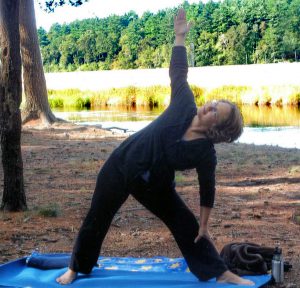
Kezia Bacon grew up in Marshfield on land that was once owned, she would later discover, by the families of Edward Winslow and Daniel Webster. She has fond memories of paddling along the rivers and using the rope swing on Barque Hill. It’s no surprise, therefore, that when it came time for her to write her senior thesis while a student at Hampshire College, she chose to research the rich local history of the land comprising the North and South Rivers watershed. Her keen sense of place has led her to write over 300 articles on the natural and social history of the South Shore for both the NSWRA website and the Mariner newspapers.
Kezia began volunteering for NSRWA in the summer of 1990 and continued to do so for several years while in college. After graduation, she served for a time as the Association’s Assistant Director. As a Registered Kripalu Yoga Teacher, she initiated the popular Yoga at the River’s Edge program, which has attracted over 1,000 participants during the past 23 years. She is also well known for her Guided Walks through such local trails as Two Mile Farm, Stetson Meadows, and Tucker Preserve. Her thoughts on the future of NSRWA? “It’s growing,” she says. “As more people experience the watershed in person, the more they become involved.” Her advice to girls and young women interested in environmental issues? “Spend more time outdoors – on the waters, on the trails. This is where you will find inspiration.”
